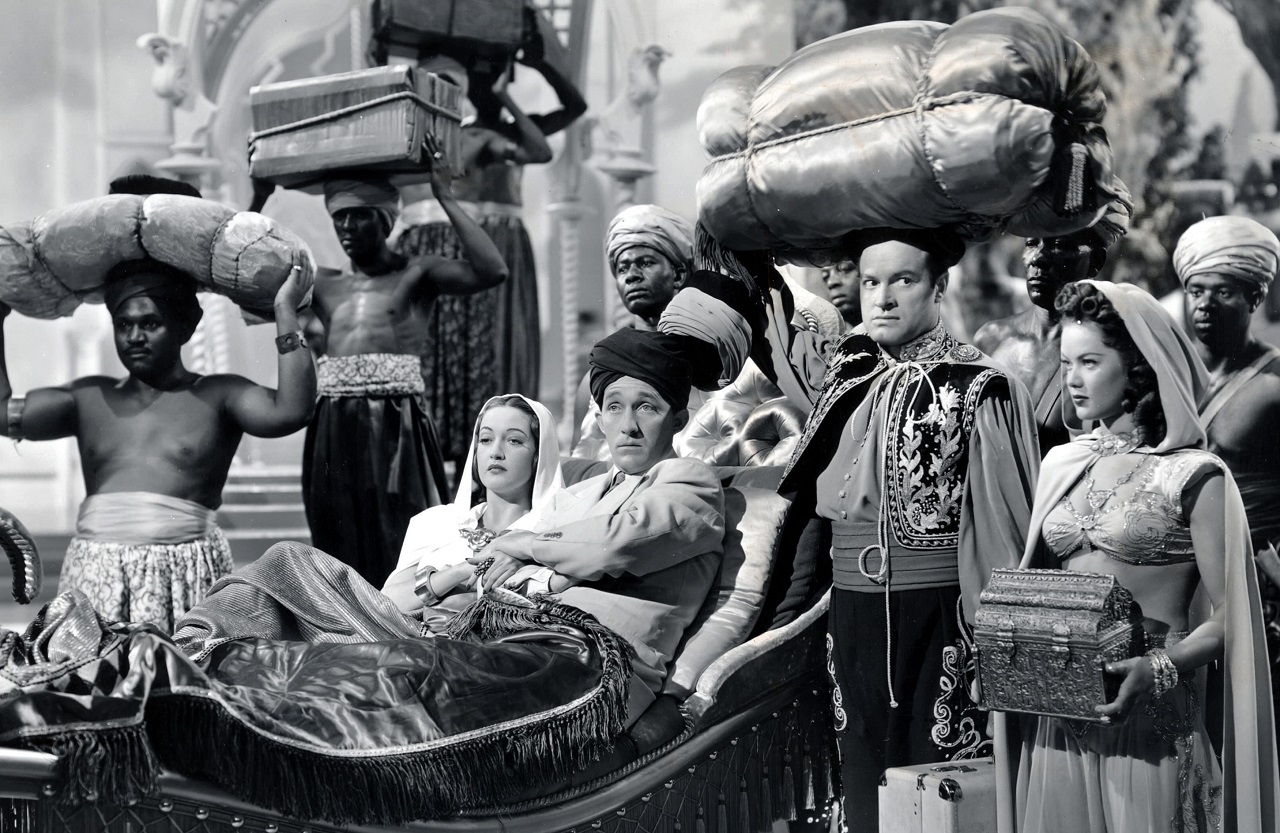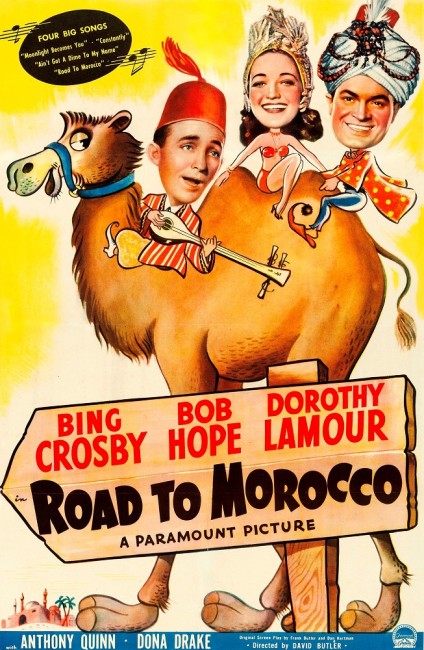Crew
Director – David Butler, Screenplay – Frank Butler & Don Hartman, Photography (b&w) – William C. Mellor, Music Supervisor – Victor Young, Songs – James van Heusen, Lyrics – Johnny Burke, Photographic Effects – Gordon Jennings, Process Photography – Farciot Edouart, Art Direction – Hans Dreier & Robert Usher. Production Company – Paramount.
Cast
Bob Hope (Orville ‘Turkey’ Jackson), Bing Crosby (Jeff), Dorothy Lamour (Princess Shalmar), Anthony Quinn (Mully Kassim), Dona Drake (Mihrirmah), Vladimir Sokoloff (Hyder Khan)
Plot
Shipwrecked stowaways Orville ‘Turkey’ Jackson and his friend Jeff are washed up on the shores of Morocco. Penniless and starving, Jeff is forced to sell Orville into slavery. Troubled by the ghost of his late aunt, Jeff eventually decides to rescue Orville but instead finds him in the arms of the Princess Shalamar who wants to marry him. In actuality, Shalamar is betrothed to Mully Kassim, a bandit chieftain of short temper, and is only marrying Jeff because the stars foretell that her first husband will die within a few days of the wedding ceremony. When Orville tries to warn him, Jeff dismisses this as merely Orville being jealous. Meanwhile, Jeff and Shalamar develop genuine feelings for one another.
Road to Morocco was the third of the Bob Hope-Bing Crosby Road films. The Road films were wacky spoofs of adventure films and were largely set around Hope and Crosby in some international (albeit studio-shot) locale, cracking fast-fire gags, outwitting one another and singing the odd number. The other entries in the series took the two of them, usually accompanied by Dorothy Lamour, along the Road to Singapore (1940), Road to Zanzibar (1941), The Road to Utopia (1946), The Road to Bali (1953) and The Road to Hong Kong (1962).
The earlier Road films had patented a wacky anything-goes comedic style. By the time of Road to Morocco, Victor Shertzinger, who had directed the first two films, had died and was replaced by David Butler, who had made the first ever science-fiction musical Just Imagine (1930). Perhaps as a result of the change of directors Road to Morocco is not as hysterically screwball as the previous two Road films – David Butler lacks Shertzinger’s zany touch. Road to Morocco is also much more dependant on plot than the previous Road entries, which were often ad libbed by Hope and Crosby. Even so, it is rather vague and aimless as a story.
Nevertheless, there is a good deal of amusement to be found in Road to Morocco. Even though they played new characters with each film, Hope and Crosby developed ongoing personas that continued throughout the series – Hope the wolfish and crafty conman who always ended up being stung by his own schemes; Crosby the deadpan fall guy with wet-eared persona who nevertheless maintained a perfect straight-face throughout and invariably ended up getting the better of Hope’s attempts to set him up. By now the audiences had so grown to Hope and Crosby’s roles that they were able to joke around with that familiarity – throughout the films they kept using the game of Patty Cake to deal with tough guys, although here the effort fails and they shrug “Yep, that sure gets around.”

There are some funny sequences with the two hiding from bandits in vases and Bob Hope then getting a fly on his nose, or where the two try to hide inside a small tent. Road to Morocco certainly raises the number of gonzo off-the-wall and frequently surrealistic gags (and in so doing brings it into genre territory). The opening song contains some cleverly self-referential lyrics: “We’ll bet that somewhere around here we’ll meet Dorothy Lamour … Paramount’ll protect us because we’ve signed up for five more pictures.”
Elsewhere, Bob Hope is visited by the ghost of his grandmother (who is also played by Hope) who has to flee: “I can’t say anymore, Orville, here comes Mr Jordan” – a reference to Columbia’s hit afterlife fantasy of the previous year Here Comes Mr Jordan (1941). There is a nonsense scene where Hope, Crosby and Dorothy Lamour sing a number in the desert and keep swapping between and singing in each other’s voices. At the end of the film, the camel turns to the audience and says: “This is the screwiest picture I was ever in.”
The Road films were essentially designed as pieces of lightweight throwaway comedic fluff for Wartime audiences. Seen today, Road to Morocco seems dated. For all the classic stature the Road films have, Road to Morocco never amounts to being anything more than shapeless and occasionally amiable. It has been almost entirely banked on Hope and Crosby’s presences to carry it. Certainly, it is stagebound in its action – for all the globe-spinning locations the plots dreamed up, the Road movies never strayed beyond the confines of studio walls.


